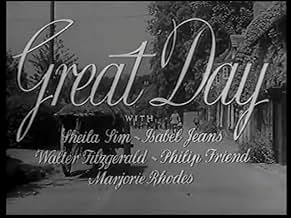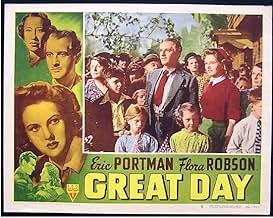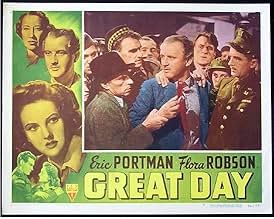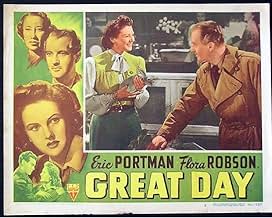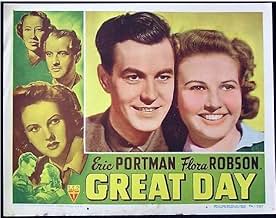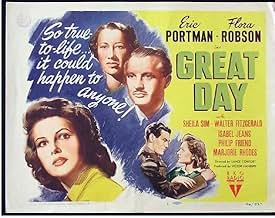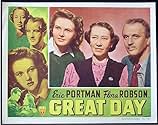Adicionar um enredo no seu idiomaAn impending Eleanor Roosevelt visit causes bustle in an English village, while the Ellis family struggles with private problems.An impending Eleanor Roosevelt visit causes bustle in an English village, while the Ellis family struggles with private problems.An impending Eleanor Roosevelt visit causes bustle in an English village, while the Ellis family struggles with private problems.
- Direção
- Roteiristas
- Artistas
Avaliações em destaque
Gosh, what an odd view the other reviews paint of this film's setting! The Women's Institute was a significant voluntary organisation during WW2. This film is one of many paying a tribute to that organisation - a recognition of their contribution to the war effort. Like other films of this type, e.g. Fires Were Started, they'd be a bit dull if they didn't include some human interest - and that is where most of the plot is driven - in particular with respect to the Ellis family.
The casting is interesting. The year before the fantastic A Canterbury Tale - a Powell and Pressburger gem - came out. The stars of this brilliant film were - Eric Portman and Sheila Sim - Captain and Miss Ellis in Great Day. The chemistry between the two in ACT was, I'm sure, what got them into Great Day. Even Miss Sim's (later Lady Attenborough, by the way) clothes were carried over - it seems!
The casting is interesting. The year before the fantastic A Canterbury Tale - a Powell and Pressburger gem - came out. The stars of this brilliant film were - Eric Portman and Sheila Sim - Captain and Miss Ellis in Great Day. The chemistry between the two in ACT was, I'm sure, what got them into Great Day. Even Miss Sim's (later Lady Attenborough, by the way) clothes were carried over - it seems!
This is both a delightful and a curious film of the effects of World War Two on rural British life in a small town setting. Throughout the war the women of the town have been supplying woolen goods to Allied Armies in order to do their bit for the war effort, even to the Russians defending Stalingrad. The film's delight comes from watching the womenfolk prepare for a visit from Eleanor Roosevelt, the American First Lady. The excitements from the anticipation of her visit surrounds the town and its activities. The curious side of the film has to do with the realization that the town never really changed very much during the war. Yes, there are fewer men, but the town still seems untouched by the horror of war. Small and petty problems are the order of the day, and ancient likes and dislikes rule the gossip. But did they not always? The subplot of Margaret Ellis's (by Sheila Sim)choice for a husband is a reflection of business as usual for small town activity. Indeed, getting in the wool is almost as important as the First Lady's visit. In one sense, the movie confirms that the British role in World War Two was indeed fitting and normal. The suspense of how the town will take to Mrs. Roosevelt and how she will view the town dominates the action. Alas, the great day is coming!
From the title, and from the brief plot summary, you might expect this to be another wartime morale booster. If it is, it is a strange one indeed.
The story is set in an English village preparing for a visit from Eleanor Roosevelt. So you might expect a celebratory story about a hard pressed but noble people. If so, you would be wrong.
Far from being noble, some of the village women are petty, gossipy, and borderline vicious. Many of course are not, but they are portrayed as normal, not noble. The story centers on the Ellis family, who have apparently moved to the village after failing elsewhere. The father, John Ellis (quite effectively portrayed by Eric Portman) is a failure in life, hanging on to his one moment of glory as an Army Captain in World War I. His wife, Flora Robson in another great performance, is long-suffering and supportive, and our hearts go out to her. Their daughter, Shelia Sim, must choose between two men: one an exciting young man her age and an older but settled man. What makes the decision difficult for her is that she has had too much of going without or just barely getting by so that she is strongly drawn security offered by the older man.
I find the remark of another viewer about obvious sets odd. Though there are some scenes like this, I found the black and white outdoor scenes quite impressive and striking. Even some scenes, such as two men talking in a field, that could have been filmed on a set were actually filmed outdoors. I was especially struck by the scenes where the father wanders the country at night, emotionally if not physically lost, while his daughter searches for him.
The movie does end on a triumphant note with Mrs. Roosevelt's visit, but if you want to see this as propaganda I guess the message would be that even these flawed people are worthwhile. For me this film was a well made, well written, well acted, interesting and moving character study.
The story is set in an English village preparing for a visit from Eleanor Roosevelt. So you might expect a celebratory story about a hard pressed but noble people. If so, you would be wrong.
Far from being noble, some of the village women are petty, gossipy, and borderline vicious. Many of course are not, but they are portrayed as normal, not noble. The story centers on the Ellis family, who have apparently moved to the village after failing elsewhere. The father, John Ellis (quite effectively portrayed by Eric Portman) is a failure in life, hanging on to his one moment of glory as an Army Captain in World War I. His wife, Flora Robson in another great performance, is long-suffering and supportive, and our hearts go out to her. Their daughter, Shelia Sim, must choose between two men: one an exciting young man her age and an older but settled man. What makes the decision difficult for her is that she has had too much of going without or just barely getting by so that she is strongly drawn security offered by the older man.
I find the remark of another viewer about obvious sets odd. Though there are some scenes like this, I found the black and white outdoor scenes quite impressive and striking. Even some scenes, such as two men talking in a field, that could have been filmed on a set were actually filmed outdoors. I was especially struck by the scenes where the father wanders the country at night, emotionally if not physically lost, while his daughter searches for him.
The movie does end on a triumphant note with Mrs. Roosevelt's visit, but if you want to see this as propaganda I guess the message would be that even these flawed people are worthwhile. For me this film was a well made, well written, well acted, interesting and moving character study.
"Great Day" couldn't be described as a great film by any stretch but it has enough of the incidental pleasures present in so many English movies (for me anyway) to be worth seeing.
First of all Eric Portman is outstanding as the pathetic WW1 Captain whose time has passed. He reminded me a little of David Niven in "Separate Tables". Flora Robson as his supportive wife is also excellent, no surprises there. It struck me looking at the familiar faces in the cast that so many of these actors always seem to have been middle-aged, was there a young Irene Handl or John Laurie, was there ever a teenage Kathleen Harrison, Marjorie Rhodes or Patricia Hayes? I can't recall them.
While it's fascinating to see the Women's Institute in action in Village England "Great Day" is very studio-bound with too obvious back-projection and the dialogue tends to the stilted. (I did like one line about a dinner invitation "Kill the fatted spam") And was Britain always drenched in sunshine?
"Great Day" is well worth one look.
First of all Eric Portman is outstanding as the pathetic WW1 Captain whose time has passed. He reminded me a little of David Niven in "Separate Tables". Flora Robson as his supportive wife is also excellent, no surprises there. It struck me looking at the familiar faces in the cast that so many of these actors always seem to have been middle-aged, was there a young Irene Handl or John Laurie, was there ever a teenage Kathleen Harrison, Marjorie Rhodes or Patricia Hayes? I can't recall them.
While it's fascinating to see the Women's Institute in action in Village England "Great Day" is very studio-bound with too obvious back-projection and the dialogue tends to the stilted. (I did like one line about a dinner invitation "Kill the fatted spam") And was Britain always drenched in sunshine?
"Great Day" is well worth one look.
The above user's review was quite succinct but I awarded him a useful star as I agreed with his every word.I too considered that the producer of "A Canterbury Tale" (1944) had a success with the pairing of Eric Portman and Sheila Sim in that film so it was decided to pair them again this time as father and daughter in "The Great Day"(1945) the following year.They had a poignant scene together where Sheila suspects her failed father is about to commit suicide but uses artful applied psychology to induce him to return to their family home and to his wife played by the great Dame Peggy Ashcroft.
I suppose it was too much to expect to see Eleanor Rooseveldt in person but I lived in hope when it was announced that America's first lady would visit the English village.I suppose had we seen her she would have just become a widow seeing as how Franklin Delano Rooseveldt died the year this film was made and just before the war ended.There was a veritable cornucopia of well known (to me) actors in the cast list which included cameos by Patricia Hayes (Mrs Cravatte in her later career in "Hancock's half hour") a fine comic and dramatic actress, Ivor Barnard, Irene Handl, Beatrice Varley, and the ubiquitous actor who played private Fraser in "Dads Army, John Laurie.
Being an aficionado of 1940s movies, especially British produced, I was surprised this 71 year old had not seen it before and I rated it with 7/10 as enjoyable.Please upload more of these gems!
I suppose it was too much to expect to see Eleanor Rooseveldt in person but I lived in hope when it was announced that America's first lady would visit the English village.I suppose had we seen her she would have just become a widow seeing as how Franklin Delano Rooseveldt died the year this film was made and just before the war ended.There was a veritable cornucopia of well known (to me) actors in the cast list which included cameos by Patricia Hayes (Mrs Cravatte in her later career in "Hancock's half hour") a fine comic and dramatic actress, Ivor Barnard, Irene Handl, Beatrice Varley, and the ubiquitous actor who played private Fraser in "Dads Army, John Laurie.
Being an aficionado of 1940s movies, especially British produced, I was surprised this 71 year old had not seen it before and I rated it with 7/10 as enjoyable.Please upload more of these gems!
Você sabia?
- CuriosidadesAccording to an article in the April 30, 1945 edition of the Monthly Film Bulletin (a B.F.I. publication), the running time of British-released prints was one hour and 20 minutes, suggesting a considerable amount of footage was cut before its release in the U.S.
- Erros de gravaçãoTowards the end when Flora Robson is talking Eric Portman into seeing Eleanor Roosevelt's visit to the village, she places her hand on his right shoulder, then her hand is on the top of his arm and then back on his shoulder again.
- Citações
John Ellis: I *will* not be bullied in my own house.
- Cenas durante ou pós-créditosAt the very end, there is a dedication to the womens institutes, in appreciation for the contributions they have made to the war effort through their crafts.
Principais escolhas
Faça login para avaliar e ver a lista de recomendações personalizadas
Detalhes
- Data de lançamento
- País de origem
- Idioma
- Também conhecido como
- Corazones intrépidos
- Locações de filme
- Denham, Uxbridge, Buckinghamshire, Inglaterra, Reino Unido(exteriors and surrounding area)
- Empresas de produção
- Consulte mais créditos da empresa na IMDbPro
- Tempo de duração
- 1 h 20 min(80 min)
- Cor
- Proporção
- 1.37 : 1
Contribua para esta página
Sugerir uma alteração ou adicionar conteúdo ausente

